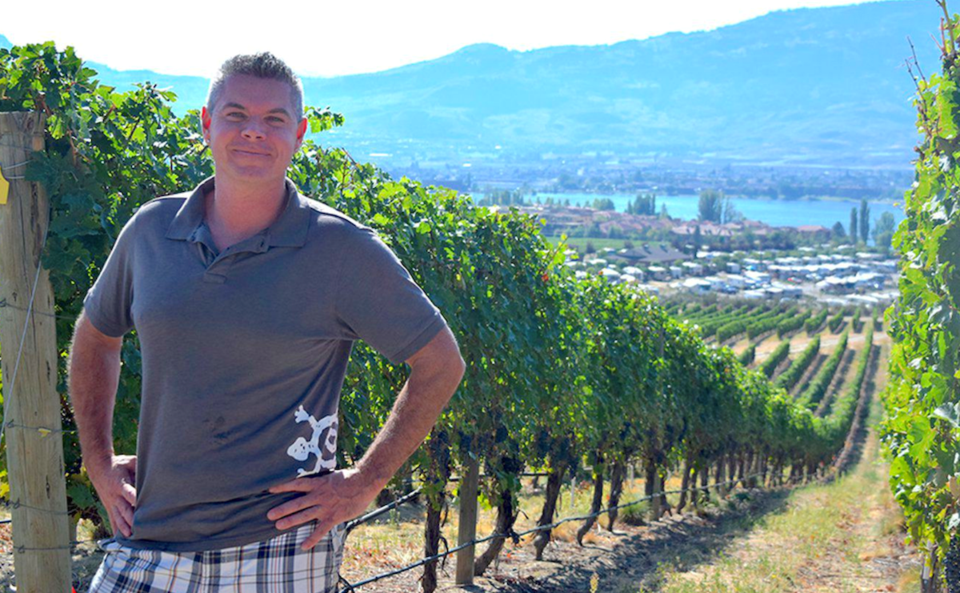Despite a season filled with wildfires, smoke and an ongoing global pandemic, the outlook is good for Nk’Mip Cellars as the grape harvest gets underway in the South Okanagan.
Winemaker Justin Hall, an Osoyoos Indian Band member, councillor and one of only two Indigenous winemakers in North America, calls every year a learning experience.
With 17 seasons under his belt — which he humbly refers to as a short period of time in terms of wine — each year Hall looks to find the best way to capitalize on the harvest to create the best quality wine he can.
“This spring was a bit cool of course, it took a little bit of its time to actually come around and get a bit of rain early on. It’s not the end of the world, but it delays things a little bit,” Hall said. “Leading then to summer all of a sudden it kind of flipped that switch and we had an absolute gorgeous summer and into this fall it has been a blessing for almost all wineries.”
The winery like most businesses is using masks, physical distancing, and other standard measures as well as a new process for guests which is making the tasting experience efficient, according to Hall, who said Nk’Mip Cellars has seen roughly half the foot traffic at the winery, but the same amount of purchasing.
“It has been really, really impactful in a good way. We have no tours at the moment, but tastings are scheduled every 15 minutes so people know they have a schedule to go on and it works well for them too, (guests) aren’t waiting around for 45 (minutes) doing nothing,” Hall said. “And I think out of that experience the quality of service has been better, better than ever.”
Each harvest, the operation which averages 250 to 300 tonnes of grapes each year takes hundreds of people working in tandem. While the harvest is certainly the exciting part, the wine season never truly ends with Hall starting to plan with pruning in January.
“The workers are out there and all the way up until now it has been a constant educated guess on where things are going to be going. A little bit of science into farming at the same time of how many tonnes per acre do I need? What are my targets for this vineyard?” Hall said. “The number of people who actually make it happen, it’s a very, very large group.”
Pulling together such a large team during a lengthy process is no small feat, especially so during rapidly changing public health orders. Much of the credit goes to the growers and workers, Hall said.
The grapes are grown on approximately 1,300 acres of OIB land which is leased out to Arterra Wines Canada, on top of 350 acres of independently-owned OIB vineyard land.
“At one time when I first started in the industry I think the Osoyoos Indian Band had 24 per cent of all the grapes grown throughout the Okanagan, growing on our land. Now we’re still around the 10 per cent number which is pretty neat,” Hall said. “There is a very good chance that if you have a wine from the Okanagan it has a 10 per cent chance it came from our land.”
As an OIB member and band councillor, Hall has not only faced the ongoing pandemic from an industrial perspective, but as a community leader as well.
“First and foremost is the protection of our people. Now, if the government is telling us something they are not doing it for nothing,” Hall said.
He said compared to the COVID-19 numbers in the U.S., Canada and specifically B.C. must be doing something right.
“We’re doing really well here, in British Columbia especially. So we’re doing something right. I do believe we have to protect our elders. My grandma, she turned 86, if she got it there is a really good chance it may be detrimental to her health, If I got it? Maybe not. It’s hard to say for sure,” Hall said.
“We follow the rules the best that we can and often we try and go above and beyond the standards.”
Dale Boyd is Local Journalism Initiative a reporter with the South Okanagan Times-Chronicle, where this story first appeared.



